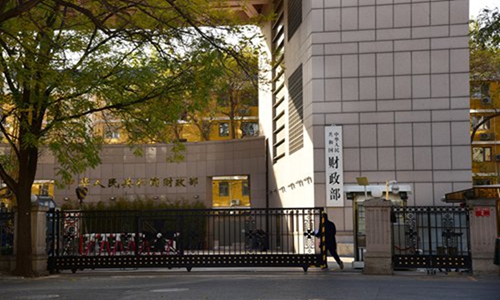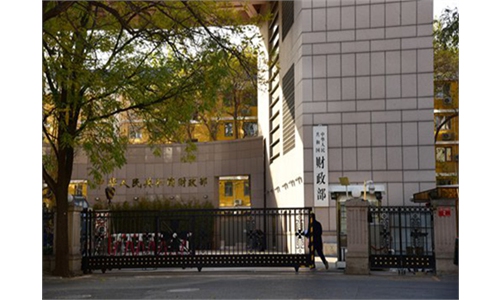China’s State Council sets 2023 deficit-to-GDP ratio at 3%, up from 2022's 2.8%
Govt ‘factors in’ concerns for sustainable fiscal growth, room to cope with risks

Ministry of Finance in Beijing Photo: VCG
China's deficit-to-GDP ratio is set at 3 percent for 2023, according to the Government Work Report submitted by the State Council, the cabinet, on Sunday to the national legislature for deliberation, as China puts an emphasis on expanding domestic demand as one of its key agenda items for driving economic growth.
The ratio, which is 0.2 percentage points higher than that in 2022, was proposed in the Government Work Report, which Premier Li Keqiang delivered to the first session of the 14th National People's Congress on Sunday.
China will enhance the intensity and effectiveness of its proactive fiscal policy in 2023, according to the Government Work Report.
To further expand domestic demand in 2023, it is also proposed that 3.8 trillion yuan ($550 billion) be allocated for special-purpose bonds for local governments. The figure compares with 3.65 trillion yuan in 2022.
The report calls for priority be given to the recovery and expansion of consumption, and the incomes of urban and rural residents to be boosted through multiple channels. It also calls for implementation of major projects set out in the 14th Five-Year Plan (2021-25) to be sped up.
Government investment and policy incentives should effectively drive investment, it said, adding that more private capital should be encouraged and attracted into major state projects and projects aimed at addressing areas of weakness.
Fully reflecting confidence in an economic recovery for this year after a decisive victory against COVID-19, while also balancing against the impact of external uncertainties, China sets its GDP growth target in 2023 at around 5 percent.
Chinese economists said the proposed budget plan means moderately expanding fiscal spending in 2023, and sectors such as infrastructure projects standing to benefit from the budget.
Dong Dengxin, director of the Finance and Securities Institute of the Wuhan University of Science and Technology, told the Global Times on Sunday that as the economy continues to stage a recovery, it still needs a "certain level of stimulus" to maintain the growth momentum.
With Western developed economies raising interest rates to tame inflation, China's real economy needs further impetus to avoid running into risks, Dong said, noting that ratcheting up the annual deficit-to-GDP ratio is deemed moderate rather than aggressive, reflecting the stable and sound development momentum of the Chinese economy.
After the optimization of COVID management measures, China's economy has rebounded at a rate that exceeded market expectations.
The official manufacturing purchasing managers' index beat expectations to hit an 11-year high of 52.6 in February, data from the National Bureau of Statistics showed on March 1.
Liao Qun, chief economist at the Chongyang Institute for Financial Studies at Renmin University of China, told the Global Times on Sunday that China enjoys a higher multiplier effect for fiscal spending than most developed economies and developing countries at a rough ratio of one fiscal dollar spent for each two dollars gained in the real economy.
The 0.2 percentage point increase in the proposed budget deficit could be translated into an increase of 0.4 percentage points of GDP growth, Liao noted.
The hike in special-purpose bonds for local governments, which would most likely be used as infrastructure investment, could potentially result in a gain of 0.1 percentage points in 2023 GDP growth, Liao noted.
Liao predicted that infrastructure investment will likely see a further growth while investment in manufacturing and real estate will also experience some gains.
Experts said the 3 percent deficit-to-GDP ratio showed that the central government factored in concerns for sustainable fiscal growth, while reserving some policy leeway for coping with potential risks throughout the year.
The Government Work Report called for China to do more to implement a prudent monetary policy in a targeted way and keep the yuan's exchange rate generally stable at an adaptive and balanced level in 2023.
The budgetary imbalances of some local governments are substantial, the report noted.
For many years, China has set the deficit-to-GDP ratio at below 3 percent.
In 2020, China set the budget deficit target to 3.6 percent of GDP to combat the economic onslaught of COVID-19. In 2021, the ratio was set at 3.2 percent.



